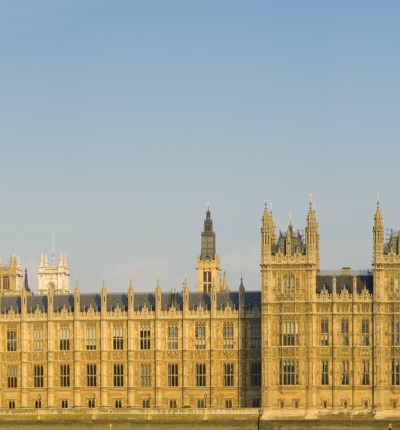
The UK Trade Bill’s ‘Genocide Amendment’ fails to embed government accountability
Lauren Chaplin and Matthew Renshaw, from our international department, discuss the ‘Genocide Amendment’ to the UK Trade Bill and why the final text falls short in requiring the government to act on reports of genocide relating to our trading partners.
Posted on 22 April 2021
The absence of a judicial oversight mechanism from the final version of the UK Trade Bill’s ‘Genocide Amendment’ leaves Parliament without the tools to properly hold bilateral trading partners to account for acts of genocide.
What is the Trade Bill?
The Trade Bill will govern the post-Brexit landscape, as the UK seeks to ‘implement procurement obligations in its own right’ and form new deals with global trading partners.
What is the Genocide Amendment?
The final text of the Trade Bill, which was agreed upon on 23 March 2021 and now awaits Royal Assent, makes provision for relevant committees in both the Commons and the Lords to publish appropriately evidenced comments when there are ‘credible reports of genocide in the territory of a prospective free trade agreement (FTA) counter-party’. The Secretary of State must respond, and, if the publishing committee deems that response unsatisfactory, it can draft a motion to be debated and voted on in the House of Commons.
The driving force behind the Genocide Amendment was Lord Alton of Liverpool, a crossbench peer who sits as vice-chair of the All-Party Parliamentary Group on Uyghurs, and who has campaigned tirelessly against their persecution. The shadow of a future trade deal with China therefore loomed large over this debate.
How does the final Amendment fall short?
The focus on Parliamentary scrutiny in the final draft of the Amendment distracts from the legal gap that Lords Amendment 3B (discussed below) sought to rectify; namely, that ‘the Government’s long-standing policy [is] that it is for competent courts to make determinations of genocide’. In formally ascribing to Parliamentary committees, rather than courts, the power of preliminary determination, the Government justifies inaction: no competent court can make a determination of genocide, so no Government action is catalysed.
Lords Amendment 3B, if accepted, would have granted the High Court of England and Wales, and its Scottish and Northern Irish equivalents, the power to make ‘a preliminary determination that another signatory to a relevant agreement represents a state which has committed genocide’. ‘Relevant agreements’ encompass prospective and pre-existing FTAs. Such a finding could arise pursuant to a person or organisation with standing bringing an allegation of genocide before a competent court. A preliminary determination would trigger an obligation on the Lord Chancellor to bring the matter before both Houses of Parliament, and arrange for it to be debated and for the Government to ‘set out its course of action relating to the determination’. This amendment was rejected by the Commons.
Instead, the Lords proposed that credible reports be referred to a ‘Parliamentary Judicial Committee’ (PJC) which would reach a preliminary determination on whether genocide had been perpetrated by a counterparty to a relevant agreement. The Commons rejected the establishment of such a committee on two grounds. First, it maintained that Parliamentary scrutiny of trade agreements provided ample opportunity for reports of genocide to be considered, and second, it invoked financial privilege on the grounds that the establishment of the PJC would have had an associated cost.
Why do domestic courts have a critical role to play in preliminary determinations of genocide?
A briefing paper by the International Bar Association’s (IBA) Human Rights Institute, published in January 2021, considered an amendment giving the High Court the power of preliminary determination, and concluded that this would be an ‘innovative and bold’ ‘practical mechanism’, enabling the UK to ‘give effect to its international law obligations’.
The Amendment would have filled the current legal gap. Although there are routes by which the British Government can seek a preliminary determination on genocide, those paths remain untrodden. For example, it has ‘never made an application to the International Court of Justice (ICJ), alleging that another state has failed to meet its obligations under the Genocide Convention’. As only governments can make such references to the ICJ, and as the Government’s policy is to only allow courts to make determinations on genocide, there exists a ‘catch-22’. This position is unsatisfactory and perpetuates inaction.
Further, even if the Government’s policy were changed, China is not obliged to submit to the jurisdiction of either the ICJ (which tries State disputes) or the International Criminal Court (ICC) (which tries individuals). As noted by Baroness Kennedy, this is respectively due to China’s treaty reservation and non-accession. Significantly, in December 2020 the ICC declined to investigate China’s treatment of the Uyghurs, as it lacked jurisdiction.
There is, then, no forum in which to try the Chinese State for its persecution of Xinjiang’s Uyghur Muslims. This reality directs us to the core purpose of the Genocide Amendment, which was arguably not to create State accountability for the commission of genocide, but to hold the UK to its duty to prevent and punish genocide, per Article 1 of the Genocide Convention – and to stop politicians preaching about human rights whilst simultaneously promoting trade with repressive regimes.
To be clear, the Genocide Amendment ‘would not have given a Court the power to terminate an international agreement’. Rather, per the IBA’s analysis, a preliminary determination could have either:
- Required the Executive to act;
- Served as a declaration of incompatibility between the Genocide Amendment and the relevant bilateral FTA, following which the Executive could either amend, withdraw, or ignore the legislation; or
- Triggered a separate process, managed by the Executive, providing for withdrawal from the relevant agreement.
In all three of these processes, the Executive retains control over how to respond to the determination, and thus its treaty-making prerogative powers remain intact.
So, why side-line the courts?
Perhaps the issue for the Government was that a preliminary determination by a court would have required action – and such action could harm trading relations. Noticeably, the Amendment in its final form requires only a response. As Lord Blencathra (Con) starkly asked, on the day the Trade Bill passed:
Certainly, the recent imposition of Magnitsky-style sanctions on four senior Chinese government officials and a Xinjiang security body demonstrates the willingness of the Government to ascribe individual accountability for human rights violations. Whilst this is to be welcomed, the Government’s toolkit for responding to genocide allegations remains incomplete without instruments to formally diagnose State accountability – and the UK Trade Bill is weaker for it.



